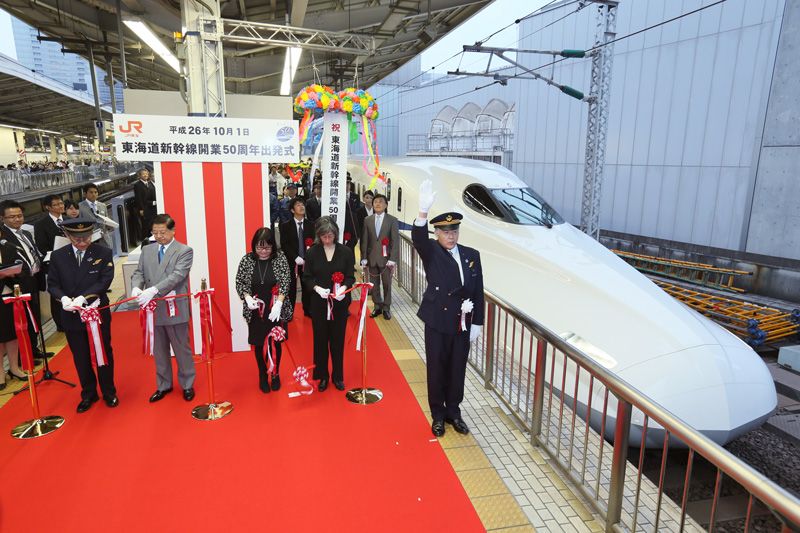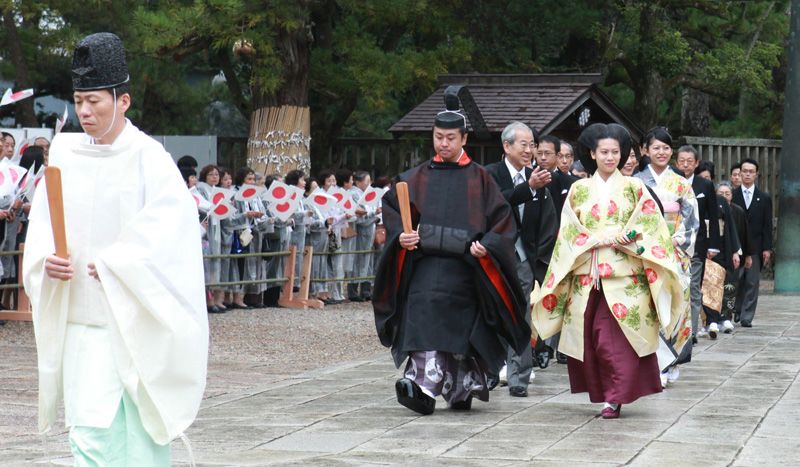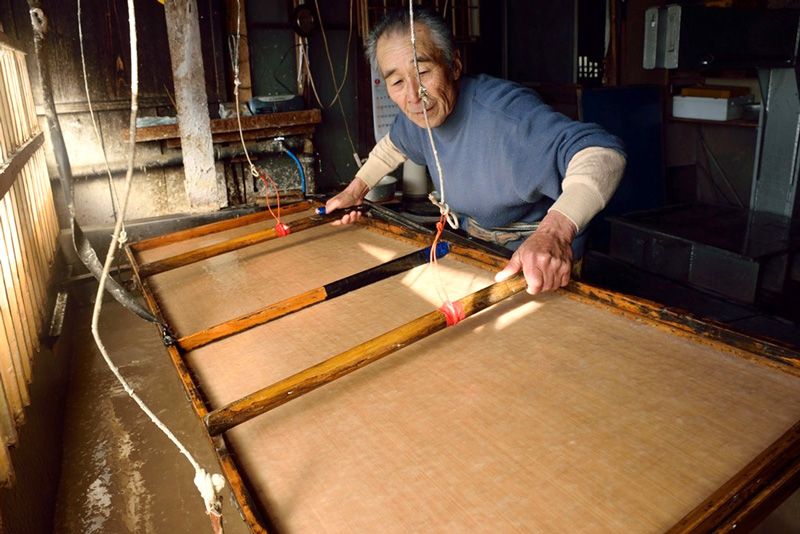Timeline for October 2014
Politics Economy Science Technology Society- English
- 日本語
- 简体字
- 繁體字
- Français
- Español
- العربية
- Русский
1
Ceremonies are held at stations in Tokyo, Nagoya, Shizuoka, and Osaka to commemorate the fiftieth anniversary of the first “bullet train” journey on the Tōkaidō Shinkansen between Tokyo and Osaka. In five decades, the route has been used by 5.6 billion passengers without a single accident-related fatality. There are currently over 300 daily services.
 The ceremony held at JR Tokyo Station. © Jiji.
The ceremony held at JR Tokyo Station. © Jiji.
The Mount Ontake eruption becomes the worst volcanic disaster of the postwar era as 47 fatalities are confirmed. This total later rises to 56 with at least 7 climbers remaining missing. On October 16, both Nagano and Gifu Prefectures call off search activities until next year, due to the increased danger of further casualties following snowfall.
Japan expands the range of items for which foreign tourists are exempt from paying consumption tax to include consumable products like food, liquor, cosmetics, and medicine. To receive the benefit, tourists must show their passports in tax-free stores and complete any necessary procedures.
2
The government announces a bill to promote women’s active participation in society. The proposed legislation will require business owners to ascertain what proportion of their employees and managers are female and to produce and make public action plans for appointing more women in senior roles. Some companies will also be required to set numerical targets.
4
As the 2014 Asian Games in Incheon, Korea, come to an end, swimmer Hagino Kōsuke is named the tournament’s most valuable player after winning four gold medals.
5
Princess Noriko, daughter of the late Prince Takamado, Emperor Akihito’s cousin, marries Senge Kunimaro at Izumo Taisha shrine in Shimane Prefecture. As a result, she is no longer part of the imperial family.
 Princess Noriko and Senge Kunimaro entering Izumo Taisha. © Jiji.
Princess Noriko and Senge Kunimaro entering Izumo Taisha. © Jiji.
6
Typhoon Phanfone makes landfall in Shizuoka Prefecture and sweeps through the Tokyo area. High waves and landslides caused by the powerful storm leave nine dead and three missing as of October 8.
7
The Royal Swedish Academy of Sciences awards the 2014 Nobel Prize in Physics to Distinguished Professor Akasaki Isamu and Professor Amano Hiroshi of Nagoya University and Professor Nakamura Shūji of the University of California, Santa Barbara, for the invention of efficient blue light-emitting diodes.
8
Japan and the United States present their interim report on revising defense cooperation guidelines. The new guidelines will expand the support Japan’s Self-Defense Forces can provide to the US military, removing references to “areas surrounding Japan” in such cases as a crisis on the Korean peninsula to impose no geographical limits. No specific reference is made to collective self-defense.
South Korean prosecutors indict Katō Tatsuya, former Seoul bureau chief for the Sankei Shimbun, for defamation of President Park Geun-hye in an August article he wrote regarding Park’s activities following the Sewol ferry disaster in April. Chief Cabinet Secretary Suga Yoshihide strongly criticizes the move as “highly regrettable for both the freedom of the press and relations between Japan and South Korea.”
16
Staffing agency Recruit Holdings makes its debut on the Tokyo Stock Exchange, rising from an initial price of ¥3,100 to ¥3,330 by the close of trading. With a market capitalization of over ¥1.8 trillion, it is the largest company to go public since NTT Docomo at ¥7.5 trillion in 1998. Recruit had remained privately held for over 50 years after being founded in 1960 but decided to go public to raise capital for overseas mergers and acquisitions.
17
The Ministry of Land, Infrastructure, Transport, and Tourism approves construction of the linear maglev Chūō Shinkansen between Tokyo and Nagoya, aiming to start operations in 2027. Work on the huge project is scheduled to begin in early 2015 and will cost around ¥5.5 trillion. When completed, the line will cut journey times between Tokyo and Nagoya to a minimum of around 40 minutes.
20
Minister of Economy, Trade, and Industry Obuchi Yūko and Minister of Justice Matsushima Midori resign from the cabinet. Obuchi offers her resignation to Prime Minister Abe Shinzō after details emerge of improper use of funds by her political support groups and campaign donors. Matsushima is forced to step down after accusations by the opposition Democratic Party of Japan that distribution of fans with her likeness to voters violated the Public Offices Election Act. Obuchi is replaced by Miyazawa Yōichi and Matsushima by Kamikawa Yōko.
22
The Ministry of Finance announces a trade deficit of ¥5.4 trillion yen for the first half of fiscal 2014. This is a new record for the first half of the fiscal year, topping the approximately ¥5 trillion deficit for the same period in fiscal 2013.
28
The Agency for Cultural Affairs announces that washi (traditional handmade Japanese paper) will likely be registered on the UNESCO Intangible Cultural Heritage list after its shortlisting by a preliminary review panel. The three kinds of paper shortlisted are sekishūbanshi from Shimane Prefecture, hosokawashi from Saitama Prefecture, and honminoshi from Gifu Prefecture. They are all made from the kōzo, or “paper mulberry.”
 Making Saitama Prefecture’s hosokawashi by hand. Photograph provided by the Agency for Cultural Affairs. © Jiji.
Making Saitama Prefecture’s hosokawashi by hand. Photograph provided by the Agency for Cultural Affairs. © Jiji.
Son Masayoshi, CEO of telecommunications giant Softbank, meets with Indian Communications Minister Ravi Shankar Prasad in New Delhi. Son announces investments of $800 million (approximately ¥88 billion) in Indian Internet companies and a desire to invest around $10 billion (¥1.1 trillion) in India over the next 10 years.
29
Two-day talks in Pyongyang between a Japanese government delegation and North Korean representatives come to an end with no information given about the fate of Japanese abductees. On October 30, Prime Minister Abe tells Japanese reporters, “North Korea has indicated that it will go beyond previous surveys, expanding its investigation by exploring new angles.”
30
The government and Tokyo Electric Power Company (TEPCO) announce a delay in removal of fuel rods from the stricken Unit 1 reactor at Fukushima Daiichi Nuclear Power Station due to debris removal and other preparatory work falling behind schedule. Removal of fuel rods from the Unit 1 spent-fuel pool will now begin in 2019, two years later than planned, and melted rods in the reactor containment vessel in 2025 rather than 2020.
The Fukuoka Softbank Hawks of the Pacific League defeat the Central League’s Hanshin Tigers 4–1 in the Japan Series to win their sixth title, three years after their last triumph.
31
The Bank of Japan surprises markets with an announcement that it will further ease monetary policy, boosting its money market policy from ¥60 trillion–¥70 trillion to ¥80 trillion per year. Consequently the Nikkei index rises over 5% to a seven-year-high of 16,455.84 and the yen falls 1.3% against the dollar to reach 110.59.
tourism UNESCO Fukushima Shinkansen North Korea South Korea washi Nobel Prize Softbank imperial family volcanoes Recruit